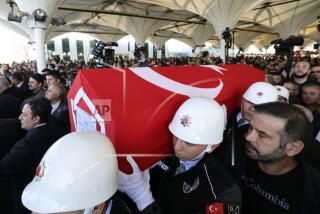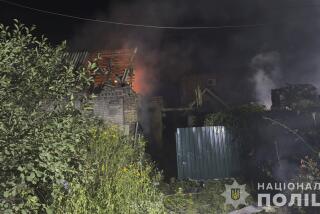Turks Hunt for Soldier Seized by Kurds
- Share via
ANKARA, Turkey — More than 1,000 Turkish troops backed by helicopter gunships kept up their search Wednesday for a soldier kidnapped by separatist Kurdish rebels in the rugged mountains of eastern Turkey, as violence spiraled in the predominantly Kurdish region.
As the troops combed the mountains of Tunceli province for Pvt. Coskun Kirandi, who was seized Monday, a spokesman for the rebel group known as the Kurdistan Workers Party, or PKK, declared that the soldier would be treated as “a prisoner of war.”
Elsewhere in eastern Turkey, the rebels lobbed rocket-propelled grenades at an infantry battalion’s base in the eastern town of Digor near the border with Armenia. Digor Mayor Hikmet Ozyunlu said loud explosions were heard in the town, followed by rounds of machine-gun fire.
“Telephone lines were cut,” Ozyunlu told the semiofficial Anatolian news agency. “The people panicked.”
In the nearby province of Bingol, meanwhile, a Turkish soldier was injured when his armored personnel carrier hit a land mine planted by the rebels.
About 100 rebels and soldiers have been killed in the east since April, when clashes between the two sides markedly intensified 10 months after the PKK ended a unilateral truce. The rebels said they had resumed the attacks because of the Ankara government’s refusal to negotiate a lasting peace.
“We say [to Ankara]: ‘Let us start talks to find a solution. Send us an official for discussions,’ ” Murat Karayilan, a PKK military commander, said in remarks quoted on the website of the pro-Kurdish MHA news agency late last month.
Karayilan, citing U.S. Defense Secretary Donald H. Rumsfeld’s recent acknowledgment that American officials had held talks with insurgents in neighboring Iraq, suggested that Ankara follow Washington’s example.
“Look at the United States,” Karayilan said. “It said it is holding talks even with organizations and people fighting against it with all means and no rules.”
Turkey categorically rules out any talks with the PKK, which it labels a terrorist organization.
The rebels waged a 15-year armed campaign to establish an independent state for Turkey’s estimated 14 million Kurds. Nearly 40,000 people, mostly Kurds, died in the rebellion. More than 1 million Kurdish villagers were forcibly displaced by the Turkish army in its campaign against the rebels.
The fighting stopped for the most part when the group declared a cease-fire after its leader, Abdullah Ocalan, was captured by Turkish authorities in 1999.
The rebels’ goal in the renewed fighting “is on the one hand to prove that they are still a force to contend with; on the other it is to blackmail the government into issuing an amnesty for all PKK rebels, including their leaders,” said Hasim Hasimi, a moderate Kurdish politician.
“Their strategy is bound to backfire,” Hasimi predicted, “and will only serve to further polarize Turks and Kurds.”
With the renewed fighting, the rebels promised early this month to carry their battle outside the mountains of eastern Turkey to the country’s seaside holiday resorts in a bid to torpedo the country’s multibillion-dollar tourism industry.
At least 20 people, including a British tourist, were wounded Sunday when a bomb planted by the Kurdish rebels exploded in the Aegean coastal town of Cesme.
European Union diplomats have expressed concerns that the violence could undermine Turkey’s efforts to join the 25-member bloc, particularly if the military uses the brutal methods it employed throughout the 1990s to combat the rebels.
Turkey is scheduled to begin membership negotiations with the EU on Oct. 3.
Some EU diplomats warn that if the human rights situation deteriorates, those talks could be delayed.
More to Read
Sign up for Essential California
The most important California stories and recommendations in your inbox every morning.
You may occasionally receive promotional content from the Los Angeles Times.













